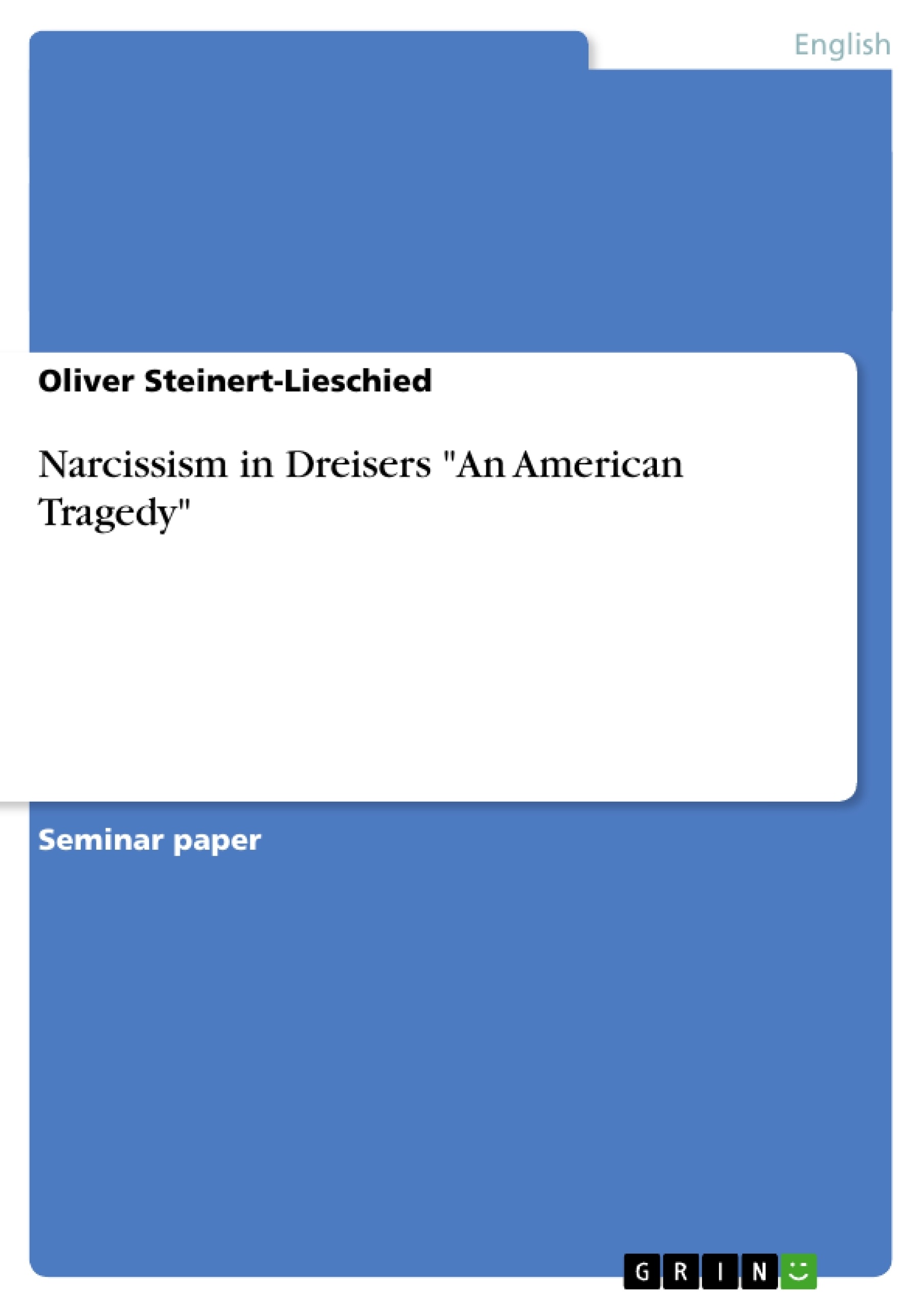Excerpt
Contents
I. Introduction
II. An Explanation of the Term Narcissism
A. The Origin of The Term
B. The Symptoms Of Narcissism
C. The Cause Of Narcissism
III. Main Part: Narcissim in Theodore Dreiser’s Novel An American Tragedy
A. Cases Of Narcissism: Hortense Briggs, Sondra Finchley, Gilbert Griffiths
B. Probable Cases Of Narcissism: Clyde Griffiths, Clyde`s parents, Reverendt McMillan
C. No Narcissism: Roberta Alden, District Attorney Mason
IV. Summary
V. Works Cited
Oliver Steinert-Lieschied
Dr. Juras
37075 Göttingen
Sept 2003
I. Introduction
In his novel An American Tragedy, Theodore Dreiser presents characters with various pychological disorders. This research paper will focus on the narcissism of selected characters in that novel. Firstly, the term narcissism and typical symptoms will be explained. Secondly, the most important characters in the novel will be analysed. Lastly, I will try to explain possible reasons for Dreiser's viewpoints and describe his social background.
II. An Explanation of the Term Narcissism
A. Origin of the Term
The term narcissism originated from the Greek mythology. The story of Narcissus is presented in Ovid’s poem-collection Metamorphoses, Book The Third:
The nymph Liriope is raped by the God Cephisus and gives birth to Narcissus. As Narcissus grows up, he rejects every admirer because of his excessive pride. Echo, a nymph, encounters Narcissus in the woods and falls in love with him. But she is rejected by him, too. Echo then fades away because of her grief. So Narcissus only brings misery over all his admirers because of his inability to love anyone save himself. Finally, Narcissus is punished for his behavior: He is lead to a fountain where he sees his reflected image and falls in love with it. Narcissus suffers from the impossibility to possess his own image and then commits suicide because he cannot stand his craving for something he cannot have. After his death his companions only find a yellow flower where Narcissus had rested (Ovid).
As Galinski states it, it is "[. . .] Narcissus' tragic inability to extend beyond himself." (53) that brings his downfall. The figure Narcissus provides some of the typical symptoms of narcissistic personality disorder: The inability to love objects outside of oneself, egocentricity and arrogance.
B. The Symptoms of Narcissism
A person who suffers of narcissistic personality disorder is described "[. . .] as possessing a grandiose sense of self-importance." ("Narcissistic") and is very egocentric. Such individuals have a sense of "entitlement" ("Narcissistic"), take for granted that other people treat them in a special way and take advantage of other people to enhance their own self-esteem ("Narcissistic"). They are unempathic and unable to identify themselves with other people’s feelings and problems ("Narcissistic"). Narcissistic people have undisciplined and "immature fantasies of success, beauty or love" ("Narcissistic") and exaggerate their own achievements and abilities ("Narcissistic"). Notable is also the constant and exhibitionistic need of admiration from others which stands in contrast to their "acted" independence and self-assuredness ("Narcissistic"). They are very choosy with which people they associate with (Comer 586). When conflicts arise they tend to be self-deceptive and often escape into a dream world where their problems are easily solved and their self-pride is "effortlessly reasserted" ("Narcissistic"). When their fragile self-esteem is attacked through criticism they often react in very emotional ways such as rage and anger or feelings of deep humiliation ("Narcissistic").
C. The Cause of Narcissism
In the prenatal state, everything the foetus needs is supplied by its mother. It lives in perfect completeness and in total narcissism (Grunberger 3).
The time of birth is an intense shock for the newborn: it experiences a "huge trauma" (Grunberger 17). The mother does her best to reduce the shock of her baby by trying to reproduce the "infant’s prenatal conditions" (Grunberger 3). When the child grows up, the father normally gradually leads the child out from its total narcissism (Grunberger 20). With this, the child is able to direct or project its self-libido to objects outside of its own "being".
However, when this development is disturbed the child remains in a state of total narcissim also when it has grown up. This is called secondary narcissism, which is pathological and which is meant by the term narcissistic personality disorder ("Narzissmus").
There are the several explanations for secondary narcissism: A weak father figure, excessive parents' admiration (Comer 587) for their child or even cold, rejecting parents (Comer 587). In the last case, the child who is deprived from the love it needs tries to compensate this by loving and admiring itself excessively as a form of self-protection (Comer 587).
III. Main Part: Narcissism in Theodore Dreiser’s Novel An American Tragedy
A. Clear Cases of Narcissism: Hortense Briggs, Sondra Finchley, Gilbert Griffiths
Hortense Briggs
The character Hortense Briggs shows nearly all symptoms of narcissistic personality disorder, and Dreiser even mentions that she "[. . .] narcisisstically painted her flight." (111; bk. 1, ch. 15). The author often decribes how Hortense admires herself: "[. . .] she looked in every mirror, admiring her eyes, her hair, her neck, her hands, her figure [. . .]" (Dreiser 77; bk. 1, ch. 11). She always wants to attract attention because of her exhibitionistic nature and regards everyone, even her friend Greta, as her opponent (Dreiser 71; bk. 1, ch. 11).
On her first date with Clyde, Dreiser already makes clear that she does not really care for Clyde and that she feels superior to him, "Now, aintcha glad? Dontcha think I’m pretty nice to you, disappointin’ a good-lookin’ fella like Charly for you?" (80; bk.1, ch. 12). She manages to impress Clyde not just a little by demonstrating her power over other men. On page 83, book 1, chapter 12, she says that she "tied a can to them" (to other men) and even boasts about her "control" over Mr. Beck, the head of her department.
[...]
- Quote paper
- M. A. Oliver Steinert-Lieschied (Author), 2003, Narcissism in Dreisers "An American Tragedy", Munich, GRIN Verlag, https://www.grin.com/document/145302
Publish now - it's free






















Comments